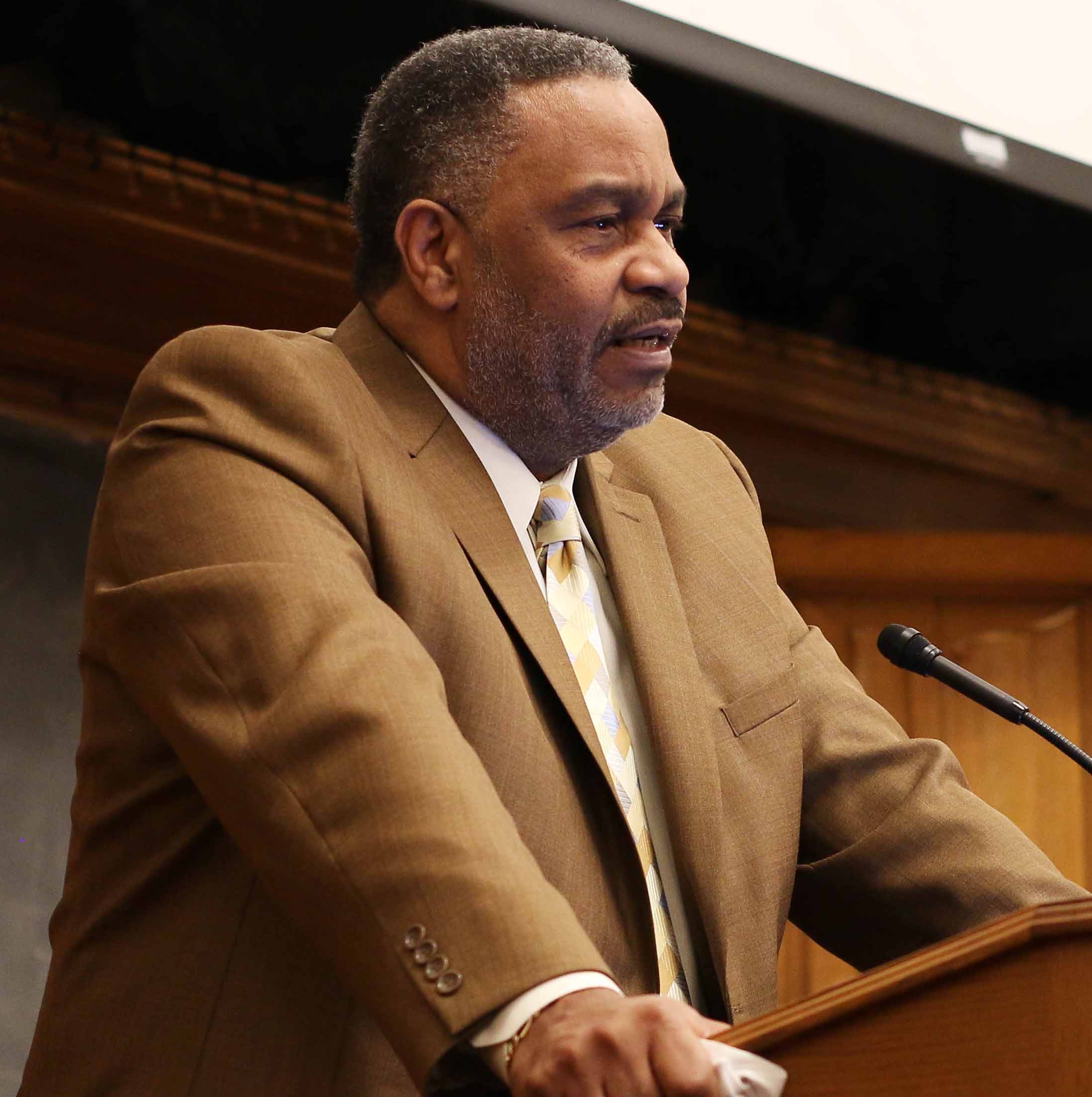
An audience of 225 people gathered in the Yale Law School auditorium Tuesday night to hear a presentation by Anthony Ray Hinton, a former Alabama death-row inmate who was wrongfully convicted on two counts of first-degree murder and finally exonerated in April after spending 30 years in prison.
At the event, which was organized by the Yale Law School’s Capital Punishment Clinic and the nonprofit Equal Justice Initiative, Hinton spoke about flaws in the criminal-justice system and discussed his experience, expressing a message of forgiveness and optimism despite his three-decade-long ordeal.
“Make no mistake, no man or woman was made to survive 30 years in a five-by-seven cell, but by the grace of God I survived,” Hinton said. “There’s an old saying: when you love something and you lose it, and it finds its way back to you, you learn to love it even more. I love life even more now.”
Hinton, who was 29 at the time of his conviction, was arrested for the murders of two restaurant managers. Prosecutors said the bullets taken from the victims’ bodies matched a .38-caliber revolver owned by Hinton’s mother, despite the fact that Hinton was at work at the time and there were no eyewitnesses. Additionally, the ballistics expert who testified against Hinton at his trial was blind in one eye.
Hinton emphasized the role that race and status played in his conviction. According to him, being a poor, black man facing a white judge, prosecution and jury “spelled conviction.”
While on death row, Hinton saw over 50 men executed by electric chair and almost a dozen commit suicide. His cell was 30 feet away from the chair, he said, and he could smell burning flesh the day after an execution. He was in prison when his mother, whom he described as “the love of [his] life,” passed away in 2002.
Despite this, Hinton credits his imagination and sense of humor with sustaining him.
“I read every book I could get my hands on for my mind to be free. I imagined being anywhere I wanted to be; my body couldn’t come with me but I allowed my mind to travel,” Hinton said. “I had the privilege of marrying … Halle Berry, Sandra Bullock and Kim Kardashian.”
After a series of lawyers and many years on death row, living in a cell with a bed so small he had to sleep in the fetal position, Hinton reached out to Bryan Stevenson, founder and attorney at the Equal Justice Initiative. The EJI provides legal representation to prisoners who have been denied fair treatment in the legal system.
The EJI brought Hinton’s case to the United States Supreme Court, where the justices unanimously decided that the state of Alabama had to hear his appeal. Ballistics experts agreed that the bullets taken from the victims did not match Hinton’s mother’s pistol, and he was freed.
Sia Sanneh LAW ’07, senior attorney at EJI and visiting clinical lecturer at the Law School, worked on Hinton’s case for several years and introduced him to the crowd as both a close friend and a hero, calling her time with him outside of prison one of the highlights of her life as a lawyer. Hinton’s case was one of the first Sanneh worked on after joining the EJI.
“Hinton has faced a remarkable injustice, and yet throughout his ordeal he has remained a person of remarkable faith, integrity, character and courage … To watch him share his story with people in the free world as we work together for a more just system [is] hard to put into words how meaningful it is, for me and for all of us at EJI,” Sanneh told the News.
Hinton says he has forgiven the state of Alabama and the individuals involved in his case. He said that while eight months cannot erase the past 30 years, he does not want to live with hate, but to appreciate his freedom and his new life: cell phone, GPS and all.
“I forgive them not so that they can sleep good at night; I forgive them so that I can sleep good at night,” he said. But he said he is still adjusting to life outside of prison: he sleeps in fetal position out of habit despite his new king-sized bed, and he still wakes up at 3 a.m. as he was forced to on death row.
Both Sanneh and Hinton addressed the racial bias and corruption at the heart of his legal proceedings and advocated for the abolishment of the death penalty, to the applause of the crowd. According to Sanneh, the need for reform is demonstrated by the fact that for every nine people executed on death row, one is identified as innocent and exonerated.
Attendees, such as Jacob Li LAW ’16, expressed their horror and shock at Hinton’s story as a symbol of the flaws in America’s criminal-justice system.
“To be honest, I don’t know that much about prison-reform policies, but I’m aware of the massive injustice that occurs within the system,” said Clio Byrne-Gudding ’19. “Thirty years on death row is appalling, and he’s one of countless people that have been victims.”
Hinton spoke of using his experience to create positive change for others who might end up in similar situations. He asked audience members to write to Congress in favor of ending the death penalty, and he mentioned public-speaking opportunities at various states and universities.
“I hope that Yale students understand that the justice system is not always fair, and I need young people to rise up,” Hinton said. “I assume there are going to be some great lawyers that come out of Yale, and I just hope they were here tonight and will remember this speech in years to come.”
The Equal Justice Initiative was founded in 1989.







